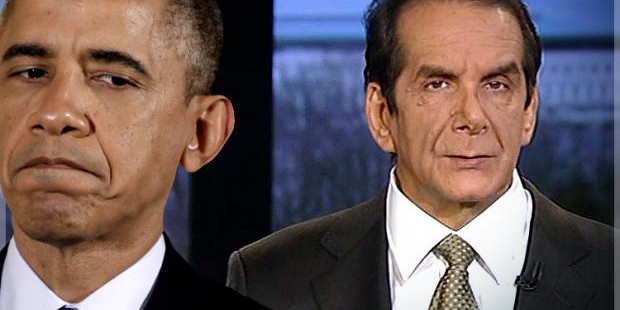
“Literally pointless”: Charles Krauthammer and disastrously wrong neocons misread Obama, again
Neocons blast West Point speech, miss the obvious: Obama’s foreign policy problem is stagnantly thinking like them
President Obama has just advised us that the front edge of our country’s foreign policy has shifted — shifted again, that is to say. Pivots, resets, evolutions, rethinks, and the like — none coming to much — are all the Obama administration’s strategy abroad consists of. Empty as the wind, these periodic reports from the White House are nonetheless important to follow, the latest more than any other.
This one came Wednesday in the president’s commencement address at West Point. The venue is logical if very regrettable, given that it reflects the extreme militarization of our foreign relations so far in our century. We are now served “this new chapter in American foreign policy,” as Obama told the cadets of the Class of 2014. There is nothing remotely new in the president’s plans, but they deserve attention nonetheless: In the nothing new lies a significant disclosure of just what this administration intends to accomplish and pass on.
“Literally pointless,” Charles Krauthammer, the neoconservative commentator, said of Obama’s address on Fox News. “It didn’t have a point. It was a defensive speech.”
I have waited long and patiently for the chance to agree with this pugilistic exceptionalist, and he makes the chances few. But the moment is not all I expected. Pointless and defensive, yes. But Krauthammer misses the paradox: In Obama’s pointlessness lies the point: He makes no point on foreign policy because he is not permitted one. In the defensive tone lies a confession that the man of resets and pivots is paralyzed.
Equally, I give this speech more stature than the neocons are willing to allow. My read: Obama wanders, but this is a significant reiteration. It is a Democratic president’s Axis of Evil speech, all too much with us already and now recapitulated from the other tendency within the orthodoxy.
“Here’s my bottom line: America must always lead on the world stage,” Obama declared. “If we don’t, no one else will. The military that you have joined is, and always will be, the backbone of that leadership.”
Elsewhere, this: “So the United States is and remains the one indispensable nation. That has been true for the century past, and it will be true for the century to come.”
These thoughts would be retro coming from any president, but they are shockingly so coming from the man of change. They bespeak a conception of America’s place in the world that is almost hopelessly stagnant. Eternal leadership; without us, chaos; indispensible nation: These themes had no validity even at origin — and not least the last, an invocation of Madeleine Albright, among the most visionless secretaries of state in the last century.
But then this from the president, up on the banks of the Hudson:
But the world is changing with accelerating speed…. From Brazil to India, rising middle classes compete with us, and governments seek a greater say in global forums…. It will be your generation’s task to respond to this new world.
A changing world, an unchanging stance toward it: There can be but one take-away here, and it is vital to grasp it if we are to understand what our country is doing in the world these days and why.
It is this: The American condition today is one of confusion — confusion and a consequent fear of the world beyond our shores that has been too prevalent in American thinking since a century before the founding. We do not seem able to act but in ways our leaders consider tried and true, even as the tried woefully often prove not true.
Let me try this another way. An era of American primacy has finished, and the many, many smart people among us understand this. These Americans are able to see their nation in historical terms — Obama, to his credit, hinted at West Point of the need to think historically. But many others, and too many of them in positions of power, have little grasp of how to use history to see straight and are closely tied to a version of our predicament rooted in myths that are faded but still familiar to all of us.
The result is what Obama truly put before us at the U.S. Military Academy this week: We cannot sensibly continue to act as we have in the past, but we can continue insensibly and best get ready, for we shall. We cannot respond otherwise, cannot imagine anew, and we are too uncertain of ourselves to innovate.
This outcome can be attributed to several practical factors, in my view. There are institutional interests — deep government, as it is called. There is circumstance: The world presses multipolarity upon America, and a century of dominance leaves the policy cupboard bare. We also have a weak leader when both of the above — entrenched bureaucracies, unthought-of tasks — require one as strong as this nation has had since FDR. Obama, to take the silly phrase of his supporters, is not the one.
It has been a lively week on the foreign policy side, certainly. Obama made an unannounced visit to Afghanistan — after a dozen years of a military presence, still it comes to surprise visits — and set a timetable for the withdrawal of U.S. troops. They will linger until 2016, but as Tim Shorrock just revealed in a Salon exclusive, arrangements for a large complement of mercenaries are already in place.

